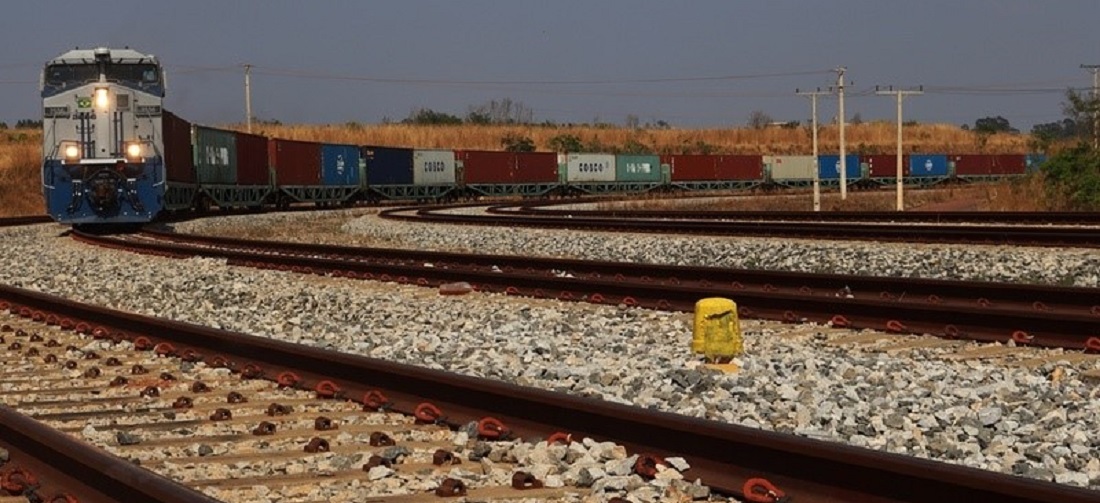
Rail operators Brado, Rumo launch first container trip on Brazil’s North-South Railway
Sep, 29, 2023 Posted by Gabriel MalheirosWeek 202339
With 58 Brado wagons on Rumo locomotives, the first train from the North-South Railway bound for Anápolis arrived in the Goiás-based municipality this week. Conducted as a commissioning test, the 1,511 km journey initiated in Cubatão, São Paulo state, took three days. This route marks the revival of a project that started 40 years ago and had its structure 100% completed in 2023.
In the first train, 58 wagons carried 112 40-foot containers, with 32 loaded with industrial inputs and agricultural pesticides from China, the United States, and Europe. The remaining 80 were empty, to be sent to export customers across the Anápolis-Santos route and to form a buffer at the Anápolis Dry Port. The buffer is essential to ensure assets for future operations.
“This is a historic moment for Brazilian infrastructure, a long-awaited route that will boost the region’s growth. It’s an honor to be part of this unique moment, offering a multimodal container solution that enables the transportation of various types of cargo by rail,” said Marcelo Saraiva, CEO of Brado.
According to Guilherme Penin, Vice President of Expansion and Regulation at Rumo, transporting containers by rail brings new economic prospects to regions served by this service. “The railway is a driver of development. The establishment of railways in leading agricultural and industrial hubs of Goiás and Tocantins promotes job creation and boosts economic activities in municipalities,” he noted.
Everaldo Fiatkoski, Operations Director of the Dry Port Centro-Oeste Group, highlighted the potential of the Dry Port Anápolis as the only container terminal in the state. “The new Container Terminal results from the expertise acquired over the last 20 years, expanding logistical capacity, reducing operational costs, and, as a result, attracting new participants in multimodality between highways and railways,” Fiatkoski said.
The first return trip will allow the transport of cotton lint from the upcoming Bahia harvest to the Port of Santos for export. Brado’s multimodal operation combines cargo movement by rail over long distances and by road over short stretches. Unlike “traditional” wagons, containers allow diversifying services by accommodating various types of cargo, from agricultural products to industrial goods.
New Market
From the Porto Seco [Dry Port] Centro-Oeste in Anápolis, the railway will serve export markets for cotton, mining, steel, and food, including sugar, soybean meal, and containerized grains, as well as beef proteins through reefer container operations. Currently, these markets move around 45,000 containers per year, with over 65% destined for the Port of Santos.
In the opposite direction, the railway will capture markets for the importation of inputs that supply industries and the agribusiness market in the state of Goiás, as well as consumer goods distributed to populations in Goiás, the Federal District, southern Tocantins, and Minas Gerais.
Important goods include agrochemicals, machinery parts, automotive components, equipment, and plastics. These markets move more than 16,500 containers per year.
One of the significant advantages of this multimodal solution is sustainability. For this new route in Goiás, Brado projects an avoided emission of 160,000 tons of CO2 over the next five years. This is equivalent to the emissions of more than 34,500 vehicles. It would take 1.1 million trees to fully absorb this volume.
Another value of the operation is road safety, reducing the distances traveled by trucks. For truck drivers, there is an improved quality of life as they cover shorter distances, which also reduces the number of accidents on the roads. Cargo gains security in the solution with the railway section, reducing losses in transport and theft. Multimodal transportation also adds regularity, operational efficiency, and competitiveness values, especially for long-distance cases.
-
DW 2019 EN
Feb, 25, 2019
0
DatamarWeek 26 February 2019
-
OTI Rankings
Jul, 06, 2020
0
DataLiner OTI Rankings (NVO Rankings) | Jan-May, 2019 & 2020 Brazil and Plate (Argentina, Paraguay e Uruguay)
-
Other Cargo
May, 18, 2021
0
Klabin to turn pulp residue into sulfuric acid
-
Ports and Terminals
Aug, 19, 2024
0
Port of Santos to inaugurate new overpass streamlining access to pulp terminals

